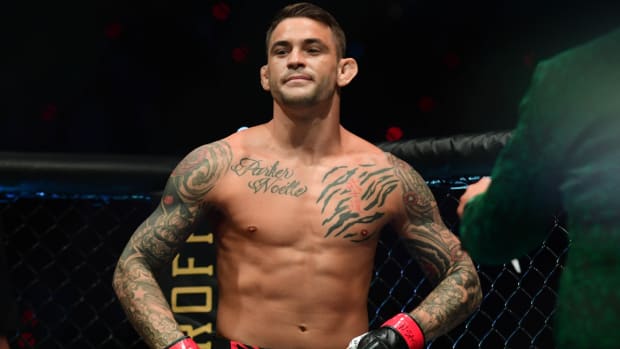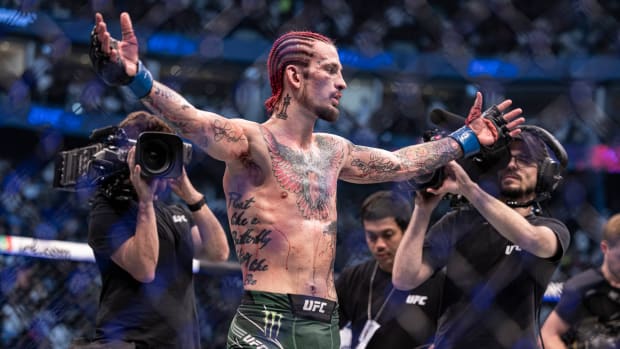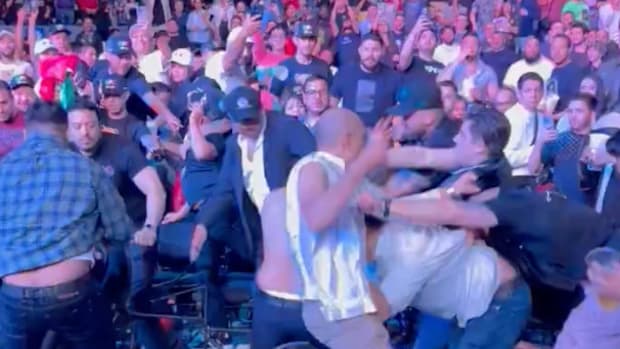Fading fast: Ronda Rousey shows how quickly the 'where are they now' point can be reached
This story appears in the July 3-10, 2017, issue of SPORTS ILLUSTRATED. To subscribe, click here.
As with magic and comedy, misdirection plays a vital role in mixed martial arts. Take an opponent to one place and drop them off somewhere else. Goad an opponent into concentrating on the right hand, then snap off a kick with the left leg. Take the fight to the ground as if trying to manipulate a limb, then transition to a triangle choke.
Lately, that misdirection applies more broadly to the sport. For months, all the attention in MMA had been funneled toward whether Conor McGregor would box Floyd Mayweather Jr., who’s held belts in five weight classes. Now that the match is set for Aug. 26, the conversation has pivoted to whether McGregor can survive with faculties intact, much less win. And all of this has diverted discussion away from the strange fate of the sport’s only other comparably popular fighter, Ronda Rousey.
Remember Rousey? Only two years ago she wasn’t merely a superstar, she was a superhero. Wonder Woman with no headband but a complement of black belts instead. She was The World’s Most Dangerous Woman, as Rolling Stone headlined a 2015 story. At SI she was The World’s Most Dominant Athlete. It didn’t seem hyperbolic. In Rousey’s first 12 professional MMA fights, only one challenger made it beyond Round 1. At UFC 175 she finished off her opponent in 16 seconds. In her next fight she needed 14. “She’s unreal,” UFC impresario Dana White told SI then. “It’s like, Are you for real?”
Inside the process of being a UFC fighter: Win or lose, what happens after a fight?
When Rousey fought, the suspense wasn’t in the outcome, it was in how her badassness would reveal itself. She punched and kicked and won one fight by delivering a vicious knee to the body. But her signature move was the arm bar, hyperextending the opponent’s elbow and occasioning a tap-out before, as she once described it to me, “ligaments will begin popping like guitar strings.”
That was the other thing about Rousey: She was as generous with her sound bites as she was with her time. Asked a question, Rousey gave an answer. She was a media darling and a social media darling, at one point adding a million Instragram followers a month. She would show up at an awards show one night and a march honoring the victims of Armenian genocide the next. And there were Hollywood roles, playing Kara in Furious 7 and playing herself in the otherwise unwatchable Entourage movie.
And then, of course, came the unthinkable bit of misdirection: Rousey lost. It wasn’t as if she dropped a controversial decision or got starched by a flash knockout. On Nov. 15, 2015, Holly Holm, a converted boxer, turned Rousey’s face to tartare before dropping her with a memorable head kick. Holm didn’t just beat the crap out of Rousey, she beat the invincibility out of her.
One of the ironies of MMA is that for all its brutality, it accommodates defeat. Mayweather may be 49–0, but in MMA such a record would be laughable. “Everybody f---ing loses. It’s part of the sport,” says Demetrious Johnson, the UFC’s flyweight champion, who’s 26–2–1. “It’s all about how you deal with it.”
In Rousey’s case the dealing has not gone well. Once omnipresent, she was suddenly nowhere. Once omnipotent, she was, by her own reckoning, stripped of power. In one of the few interviews she’s given in the last 18 months, she told Ellen DeGeneres that after her first loss, “I was down in the corner, and I was like, What am I anymore if I’m not this? I was literally sitting there and thinking about killing myself, and that exact second I’m like, I’m nothing.What do I do anymore? and No one gives a s--- about me anymore without this.”
While Rousey fought every few months during her heyday, she idled for more than a year. Finally, she decided to reenter the octagon to try and win back the bantamweight belt. But it came with a condition: Suddenly phobic of publicity, she would do no prefight media. In what was, notionally, her comeback fight, last Dec. 30, she lost in 48 seconds.
Ronda Rousey engaged to boyfriend Travis Browne
And then she really partitioned herself from the public. Rousey did a news cycle cameo in May to say that she would captain a team on the Battle of the Network Stars reboot. She announced her engagement to UFC heavyweight Travis Browne. But otherwise she’s gone ghost. Among it all, there’s no indication that Rousey, now 30, will fight again. And posing the question isn’t an option. Asked for an interview, her team sent back word that she would consider the request but “know in advance she won’t discuss anything fight-related.”
It’s a reminder that sports celebrity has its own set of thermodynamics. The same way Rousey won fights in record time, her star has dimmed with unforgiving speed. If nothing else, it might be instructive for McGregor. There’s a delicacy to greatness. Quickly, in sports, the future melds into the present and then the past. One day the inquiry is, “Are you for real?”
Blink and it’s, “Where Are They Now?”





